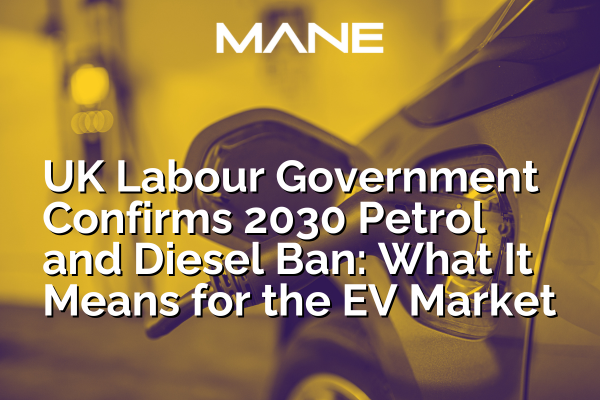UK Labour Government Confirms 2030 Petrol and Diesel Ban: What It Means for the EV Market
21 May, 20252 minsThe UK Labour government has officially confirmed the reinstatement of the 2030 ban on new p...

The UK Labour government has officially confirmed the reinstatement of the 2030 ban on new petrol and diesel car sales, providing much-needed clarity for both the automotive industry and consumers. This decisive move reverses the previous government's decision to push the deadline back to 2035 and reaffirms the UK's commitment to a greener transportation future.
The New Timeline and Flexibility Measures
Under the confirmed plan, new cars powered solely by petrol or diesel will not be sold after 2030, while hybrid vehicles will be permitted until 2035. This phased approach provides a transitional period that balances environmental ambition with practical considerations for industry adaptation and consumer needs.
Transport Secretary Heidi Alexander emphasised the government's commitment to supporting British business, stating: "Our automotive industry deserves clarity, ambition and leadership. That is exactly what we are delivering today."
The announcement comes with several important nuances that offer flexibility to manufacturers:
- Full hybrids (like the Toyota Prius), plug-in hybrids, and innovative systems like Nissan's e-Power will be allowed until 2035
- Small and micro-volume manufacturers producing fewer than 2,500 cars annually (including luxury brands like McLaren and Aston Martin) will be exempt from the 2030 phase-out
- Vans with internal combustion engines can continue to be sold until 2035
Updates to the Zero Emission Vehicle (ZEV) Mandate
Alongside the ban confirmation, the government has introduced significant changes to the Zero Emission Vehicle (ZEV) Mandate, which sets targets for the percentage of electric vehicles manufacturers must sell each year.
Key updates include:
- Reduction in fines for failing to meet ZEV targets from £15,000 to £12,000 per car
- Extension of the credit borrowing scheme from 2026 to 2030, allowing manufacturers to offset current underperformance by overachieving in future years
- A new flexibility allowing manufacturers to transfer credits between car and van fleets
- Extension of the CO2 Trading Scheme until 2029, enabling companies to earn credits for reducing emissions across their non-electric fleet
These measures acknowledge the industry's challenges while maintaining the core commitment to the 2030 phase-out date.
Impact on the UK EV Market
The UK electric vehicle market is already thriving, with the UK established as Europe's largest EV market and the third largest globally. In 2024, over 382,000 EVs were sold, representing a 20% increase from 2023.
This policy confirmation provides the certainty that manufacturers need for product lifecycle planning. As Matt Galvin, UK Managing Director of Polestar, noted: "What vehicle manufacturers need is certainty to support product lifecycle planning."
The government has also announced a £2.3 billion investment package to boost British manufacturing of zero-emission vehicles and improve charging infrastructure. There are now more than 75,000 public charge points in the UK, with one added every 29 minutes.
Affordability Considerations
For consumers, affordability remains a key consideration in the transition to electric vehicles. Research shows that 68% of Britons cite affordability as the biggest barrier to EV adoption.
However, the economic case for EVs is becoming increasingly compelling:
- Half of used electric cars are now sold at under £20,000
- 29 brand new electric cars are available from under £30,000
- Drivers can save approximately £1,100 annually by charging overnight at home compared to fuelling a petrol vehicle
- The government has committed to continuing tax breaks worth hundreds of millions of pounds to help people switch to electric vehicles
Innovative financing solutions like salary sacrifice schemes are also making EVs more accessible, potentially saving employees 20-50% on the price of an electric car.
Talent and Recruitment Implications
The confirmed 2030 ban creates significant opportunities in the automotive and adjacent sectors. As the industry transforms, there will be growing demand for professionals with expertise in electric vehicle technology, battery development, charging infrastructure, and sustainable manufacturing processes.
Companies looking to position themselves for success in this evolving landscape will need to prioritise attracting and retaining talent with the right skills. This includes electrical engineers, software developers, battery specialists, sustainability experts, and professionals familiar with the unique supply chains of the EV ecosystem.
For recruiters and talent acquisition specialists, understanding these industry shifts is crucial. The most successful recruitment strategies will focus on identifying candidates who can help businesses navigate the transition to electric mobility and capitalise on the opportunities presented by the 2030 ban.
Businesses that develop comprehensive talent strategies now will be better positioned to thrive in the electric vehicle market of tomorrow. This may involve upskilling existing employees, partnering with educational institutions, or implementing innovative recruitment approaches to attract specialists from related fields.
Looking Ahead
The confirmation of the 2030 ban provides a clear roadmap for the UK's transition to zero-emission transport. With strong government support, growing consumer interest, and ongoing technological improvements, the UK is well-positioned to maintain its status as a leading EV market.
As Prime Minister Keir Starmer emphasised: "I am determined to back British brilliance. Now more than ever UK businesses and working people need a government that steps up, not stands aside."
The road to 2030 presents both challenges and opportunities, but with the right policies, investments, and talent strategies in place, the UK can achieve its environmental goals while creating economic opportunities in the process.


